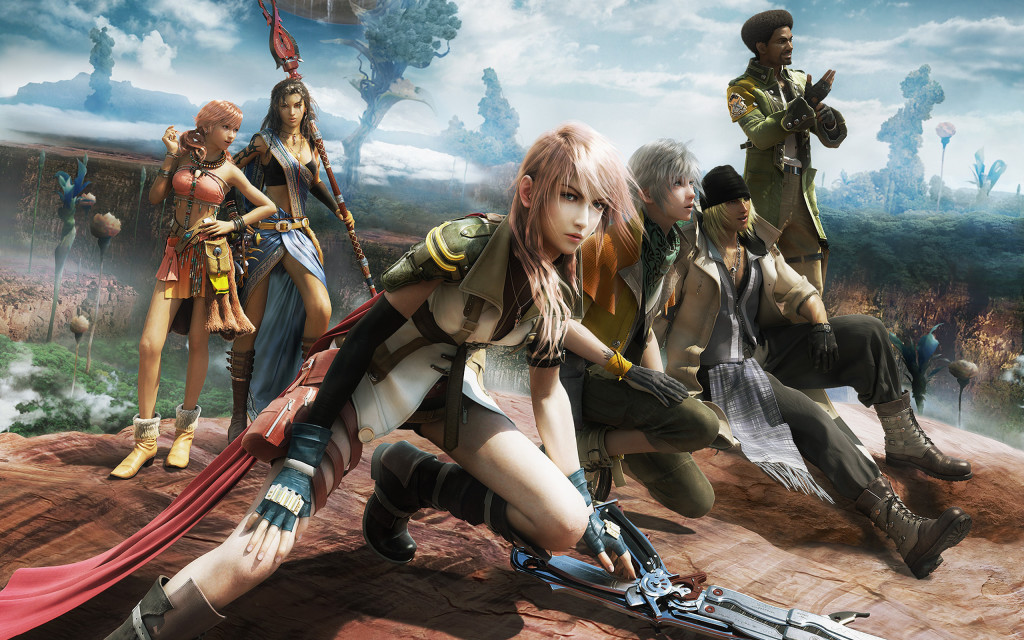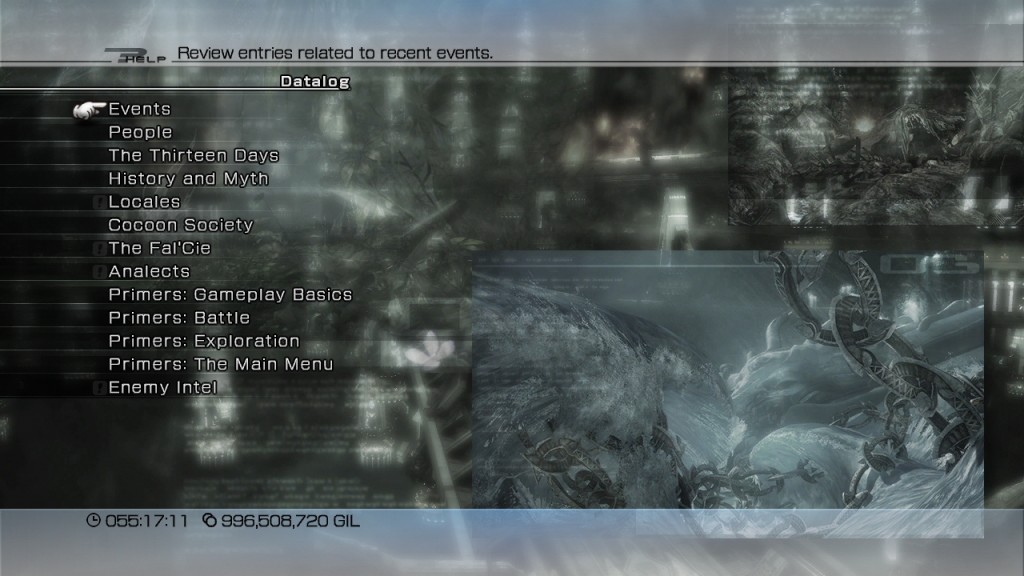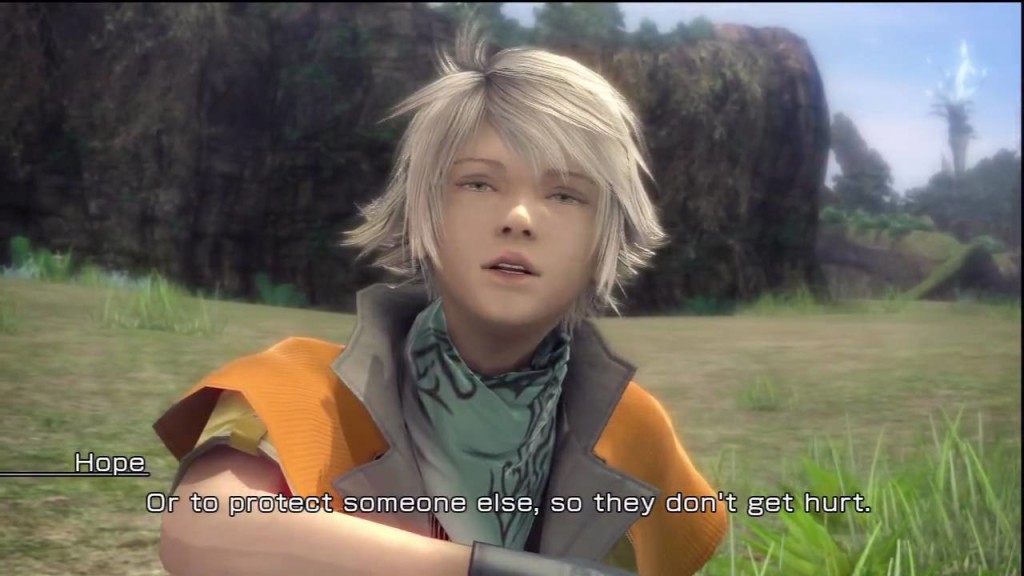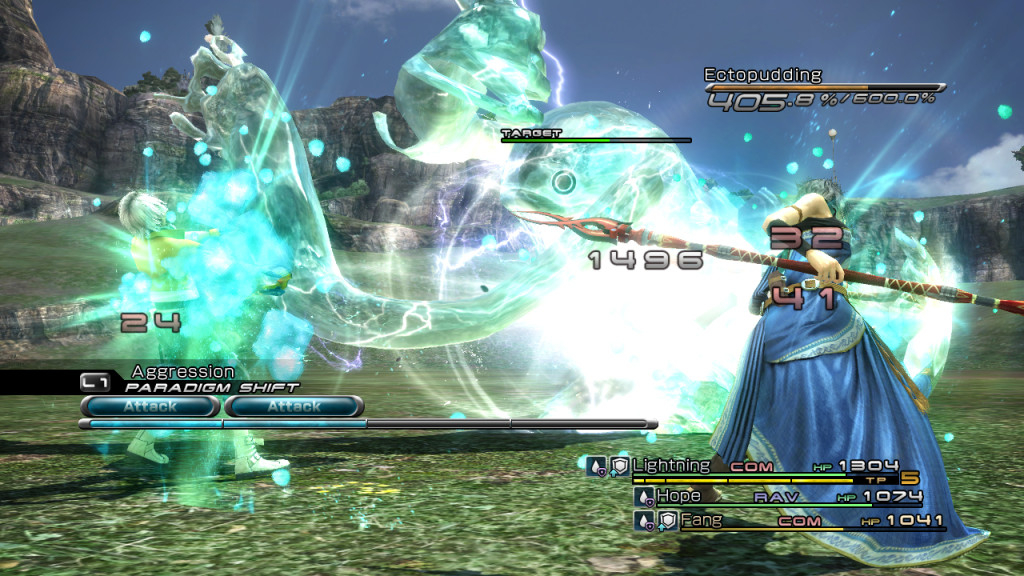Ever have a weird craving for a particular game you played years ago, and you’re not sure why? Ever want to give a strange game a second chance? I certainly did last week!

Whatever prompted me to start playing Final Fantasy XIII remains a mystery to me, but since I’ve sunk 23 hours into the game over the past two week (DEAR GOD HOW DID THAT HAPPEN), let’s talk about it. I’d like to point out some interesting things of note during Playthrough 2 of this quirky, strange, experimental entry in the long-running series. I would guess not many people bothered to play the game a second time; then again, they also aren’t insane like me, so I don’t expect that kind of dedication!
I remember people enjoying Final Fantasy XIII when it first arrived on the scene. A victim of development hell and delays up the wazoo (since every Final Fantasy game that delayed also meant a delay of XIII), the product finally arrived 4/5 years after its initial announcement in 2010. I, for one, remember enjoying it a lot, but some things about it really turned me off. For one, the plot seemed like an incomprehensible mess of L’Cie, fal’cie, Cocoons, Focuses, Pulses, and a whole lot of other metaphysical nonsense (note: it does make sense, but not at a glance). It’s never a good idea to relegate important ideas to a Wikipedia-style Datalog, but that just hints at the game’s troubled development cycle.

The English voice cast also left a lot to be desired; while Sazh (the black guy with an afro – typical Japan) looked a clear standout, other characters (like Hope) simply grated on the ears over time. Add the weird decision to make Vanille and Fang “Australian”, and things go strange right quick. How do you fix this sort of thing? Apparently, by playing the game with Japanese voice language, thanks to the game’s Steam release. I cannot begin to tell you how much this improves the game from an overall standpoint. The character facial animation and vocal inflection don’t feel weird anymore; they actually fit. Sure, the game’s script isn’t a direct translation by any means (you still get hints of colloquialisms and other vestiges from the English script), but I actually knew, or could at least figure out, what was happening and what I was doing.
I suppose I might be a bit strange, but subtitles allow me to actually pay attention to what’s being said, and for an in media res story like this, it helps parse out that initial period of unfamiliarity. The best change, though, is that Hope becomes a character I actually like. These are not words I thought I would ever utter, but his Japanese voice actor really nails it and gets across the emotional state without devolving into whiny emo kid territory. I can say that, if you’ve never played the game, find a version with Japanese voice language (Steam version or Asian version on PS3, I’d suspect), because either one will endear you to the game far more than it might originally.

What hasn’t changed, and what still works incredibly well, is that convoluted mess of a battle system! I’m not going to describe it in detail (that’s for the purpose of reviews and the like), but the mashup of turn-based and real-time strategy actually functions as a whole, complete system. In other Final Fantasy game, you’ll notice a clear desire to extend a game’s length via random battles and combat sequences; at times, you can grind and become overpowered. This doesn’t happen at all in Final Fantasy XIII, since character growth is restricted by progress in the story. As such, the game forces you to learn the combat system’s intricacies and nuances – trust me, you’ll be doing a LOT of it.
So many battles, and seeing how they link together to teach the player its complexities, has been one of the subtle joys of this playthrough. I remember many reviewers saying that the slow pace of the tutorials spread over a twenty hour period felt quite pedantic. However, noticing how the game arranges your party for plot and combat purposes, I see exactly what they were doing. Each one of these weird party configurations exists to encourage new strategies using one of the six classes in the Paradigm Shift system, and taking advantage of each party member’s unique strengths makes these combat sequences faster and easier by a long shot.
 If you’ve read this blog with any regularity, you know I like dense, convoluted systems, and this one’s no different. I’ve probably died more than on my previous playthrough, but I’m enjoying the process of optimization (even if Lightning, Hope, and Fang remains the best team for nearly every situation). I found myself using Sentinel (the tank class) a lot more than before, and it actually turns some previously insane battles into a total cakewalk if you’ve got good timing and understanding of enemy patterns. Weaknesses are also essential to discover, and using Libra repeatedly hastens the process of speedy battles. I certainly don’t remember getting five star ratings on every battle, but that’s pretty close to happening here!
If you’ve read this blog with any regularity, you know I like dense, convoluted systems, and this one’s no different. I’ve probably died more than on my previous playthrough, but I’m enjoying the process of optimization (even if Lightning, Hope, and Fang remains the best team for nearly every situation). I found myself using Sentinel (the tank class) a lot more than before, and it actually turns some previously insane battles into a total cakewalk if you’ve got good timing and understanding of enemy patterns. Weaknesses are also essential to discover, and using Libra repeatedly hastens the process of speedy battles. I certainly don’t remember getting five star ratings on every battle, but that’s pretty close to happening here!
The long and short of it, is that I’m enjoying myself immensely with Final Fantasy XIII on my second time around (I didn’t even mention the soundtrack or the art design, which are really subjects in themselves). I like to think of it this way: some games really are worth a second look, and Final Fantasy XIII ended up being a trip worth taking again. Whether hype, or peer pressure, or gaming culture in general, a lot of contextual factors can affect how we enjoy a game (not to mention what’s going on in our lives). I know I just played Bayonetta right before FFXIII came out, so I can’t say anything would top Bayonetta, that’s for sure! Thus, this second time arrives without preconceived notions or other game comparisons to spoil it. Fundamentally, Final Fantasy games usually try for something new; whether they succeed or fail, they perennially remain interesting, which is more than I can say for some game series.
If God is a God of second chances, then we should be as well for things we didn’t like or things we’d never touch again. Sometimes, you may find something relevatory, certainly something far more than you imagined when you started. God was patient enough to wait for me; I think I can be patient enough with the rest of the things in my life to reach full bloom, right?
8 But do not let this one fact escape your notice, beloved, that with the Lord one day is like a thousand years, and a thousand years like one day. 9 The Lord is not slow about His promise, as some count slowness, but is patient toward you, not wishing for any to perish but for all to come to repentance.
2 Peter 3
